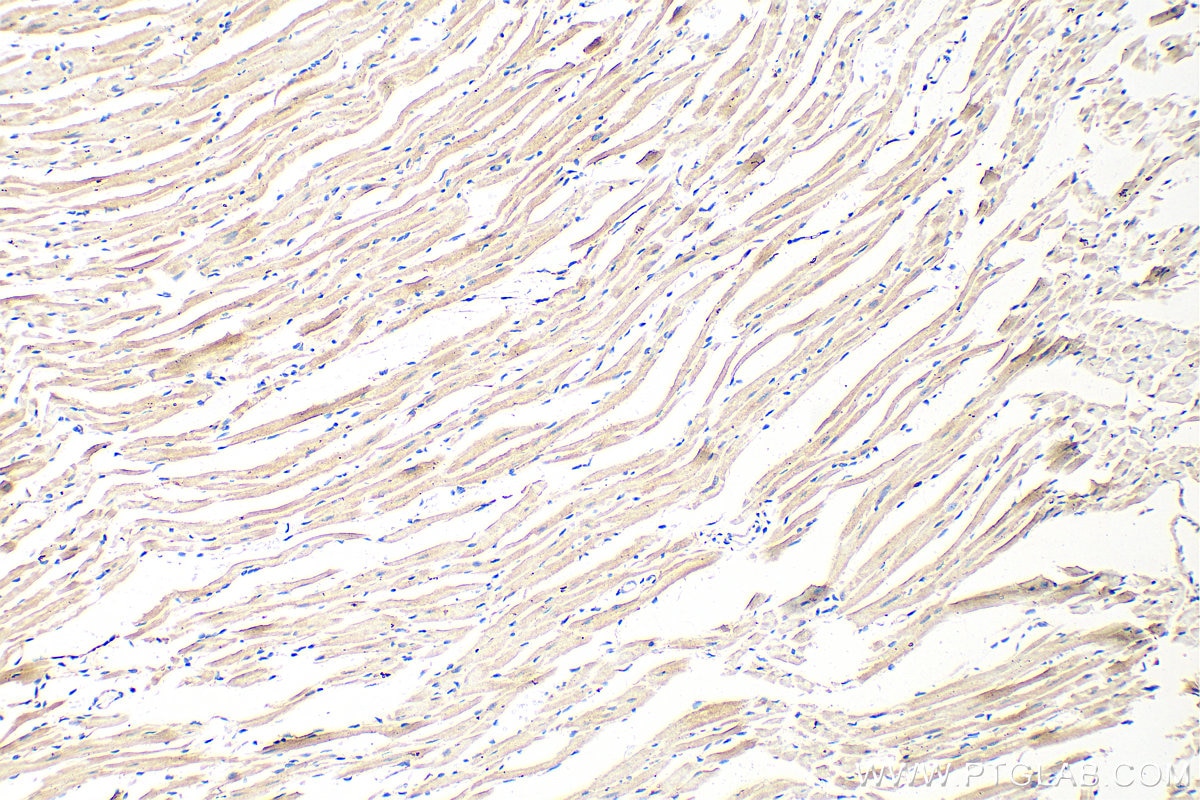TMEM43 Polyklonaler Antikörper
TMEM43 Polyklonal Antikörper für IHC, ELISA
Wirt / Isotyp
Kaninchen / IgG
Getestete Reaktivität
human, Maus, Ratte
Anwendung
IHC, ELISA
Konjugation
Unkonjugiert
Kat-Nr. : 16362-1-AP
Synonyme
Geprüfte Anwendungen
| Erfolgreiche Detektion in IHC | Mausherzgewebe Hinweis: Antigendemaskierung mit TE-Puffer pH 9,0 empfohlen. (*) Wahlweise kann die Antigendemaskierung auch mit Citratpuffer pH 6,0 erfolgen. |
Empfohlene Verdünnung
| Anwendung | Verdünnung |
|---|---|
| Immunhistochemie (IHC) | IHC : 1:50-1:500 |
| It is recommended that this reagent should be titrated in each testing system to obtain optimal results. | |
| Sample-dependent, check data in validation data gallery | |
Produktinformation
16362-1-AP bindet in IHC, ELISA TMEM43 und zeigt Reaktivität mit human, Maus, Ratten
| Getestete Reaktivität | human, Maus, Ratte |
| Wirt / Isotyp | Kaninchen / IgG |
| Klonalität | Polyklonal |
| Typ | Antikörper |
| Immunogen | TMEM43 fusion protein Ag8522 |
| Vollständiger Name | transmembrane protein 43 |
| Berechnetes Molekulargewicht | 400 aa, 45 kDa |
| GenBank-Zugangsnummer | BC008054 |
| Gene symbol | TMEM43 |
| Gene ID (NCBI) | 79188 |
| Konjugation | Unkonjugiert |
| Form | Liquid |
| Reinigungsmethode | Antigen-Affinitätsreinigung |
| Lagerungspuffer | PBS with 0.02% sodium azide and 50% glycerol |
| Lagerungsbedingungen | Bei -20°C lagern. Nach dem Versand ein Jahr lang stabil Aliquotieren ist bei -20oC Lagerung nicht notwendig. 20ul Größen enthalten 0,1% BSA. |
Hintergrundinformationen
Transmembrane protein 43 (TMEM43), a member of the TMEM subfamily, is encoded by a highly conserved gene and is widely expressed in most species, ranging from bacteria to humans. The TMEM43 S358L mutation on chromosome 3p25 is an important cause of arrhythmogenic right ventricular cardiomyopathy (ARVC) as it enhances the NF-κB-TGFβ signal cascade, which can lead to aggressive disease at the early stage, and might later develop into heart disease. (PMID: 35260078)
Protokolle
| PRODUKTSPEZIFISCHE PROTOKOLLE | |
|---|---|
| IHC protocol for TMEM43 antibody 16362-1-AP | Protokoll herunterladenl |
| STANDARD-PROTOKOLLE | |
|---|---|
| Klicken Sie hier, um unsere Standardprotokolle anzuzeigen |


